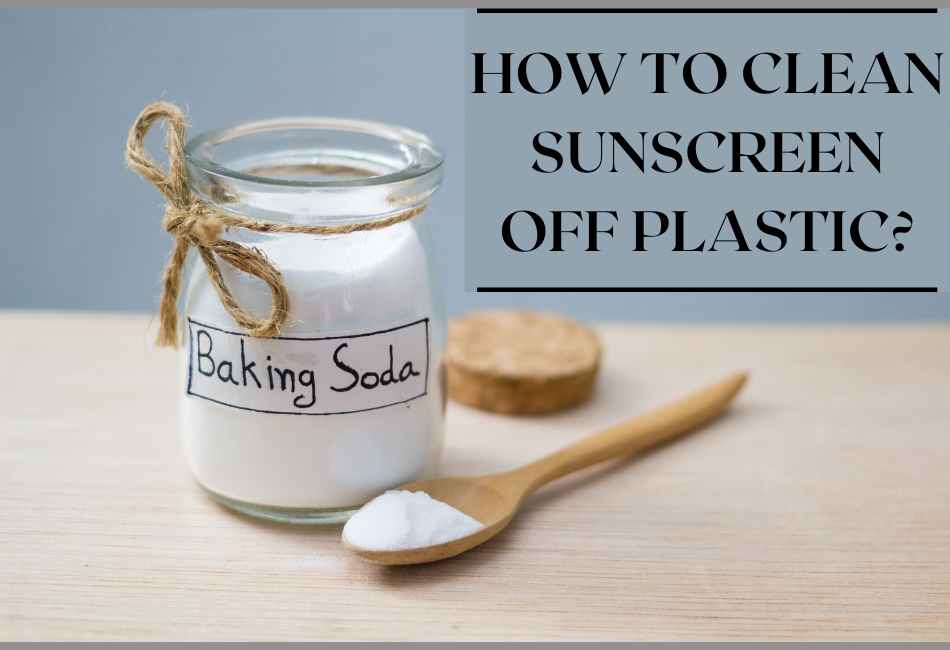Sunscreen holds an integral place in our daily lives, playing the critical role of protecting our skin from the harsh effects of UV radiation.
However, amid summer picnics, beach outings, and poolside fun, our plastic items are often unintentionally coated in sunscreen.
This sticky situation is visually unappealing and can compromise the plastic item’s longevity. But don’t fret! This blog aims to help you tackle this very issue.
We will guide you through five effective, easy-to-follow home remedies that will aid you in cleaning sunscreen off plastic items, restoring their original glory.
What is the Effect of Sunscreen on Plastic?
Sunscreen is a complex formulation with several active ingredients. One of the most common is oxybenzone, a chemical that absorbs harmful UV rays, protecting our skin from damage.
In my experience, products containing oxybenzone are particularly tenacious, often leaving residue on anything they come into contact with.
How these chemicals interact with plastic surfaces
You might be wondering how oxybenzone and similar chemicals interact with plastic. These substances tend to adhere to plastic surfaces, forming a stubborn, often greasy layer.
I remember once I had a plastic beach ball that had sunscreen all over it. Cleaning that was a task and a half let me tell you!
Consequences of prolonged sunscreen exposure on plastic items
The consequences of prolonged sunscreen exposure on plastic items can be quite severe. The chemicals can cause discoloration and even weaken the plastic over time.
I learned this the hard way when a favorite pair of sunglasses had streaky, weakened frames after a sunscreen-heavy summer.
1. Vinegar Solution
- Mix ratio and application method
A vinegar solution is one of the most effective ways to deal with sunscreen residue. Mix one part white vinegar with two parts water.
Apply the solution to the plastic surface using a soft cloth or sponge, then gently scrub the residue.
- Vinegar’s effectiveness in breaking down sunscreen residues
Vinegar’s acetic acid content helps break down the sunscreen residue, making it easier to remove. I tried this on an old plastic patio chair covered in sunscreen, and it worked like a charm.
- Cautionary notes or considerations
A quick caution: While vinegar is safe for most plastics, some types might react differently.
Always do a small spot test first to ensure the vinegar doesn’t discolor or damage the plastic.
I lost a lovely plastic serving tray to my over-enthusiastic vinegar application, so take it from me: a little caution goes a long way!
2. Baking Soda Paste
Baking soda is another great home remedy for tackling sunscreen residue on plastic items.
- Recipe and preparation
The recipe is simple: Mix three parts baking soda with one part water to create a thick paste. I remember whipping this up in my kitchen for the first time and being pleasantly surprised by how easy it was!
- Abrasive nature aiding in the removal of sunscreen buildup
The slightly abrasive baking soda helps scrub off the stubborn sunscreen marks effectively. I once used it to clean a plastic cooler that had become rather unsightly from sunscreen stains – and it worked wonders.
- Suitable plastic surfaces for this remedy
This remedy is perfect for sturdy plastic surfaces that can handle a bit of elbow grease. I’ve used it on everything from garden furniture to plastic toys with great success, remember to rinse thoroughly afterward!
3. Lemon Juice
Another natural solution I’ve found fantastic for cleaning sunscreen off plastic is lemon juice.
- Citrus properties as a natural cleaning agent
Lemon juice, with its high citric acid content, works well at breaking down sunscreen residues. Plus, it’s a natural and eco-friendly option, which I always appreciate. It amazingly cleared up the sunscreen smears on a plexiglass tabletop I had.
- Application process and safety tips
To apply, squeeze a fresh lemon and rub the juice onto the sunscreen-smeared plastic with a soft cloth. Rinse with warm water and dry completely.
However, be cautious when using lemon juice on colored plastics, as it can sometimes cause discoloration. Just like with the vinegar, I recommend doing a spot test first.
- Lemon’s refreshing scent is a bonus
A bonus is that lemon leaves your items smelling fresh and clean. You might not think this is a big deal until you’ve scrubbed your child’s plastic toys with it – trust me, the fresh, lemony scent is a definite upgrade!
4. Dish Soap and Warm Water
Sometimes, the best solution is the simplest, and that’s certainly the case with dish soap and warm water.
- Ideal dish soap selection
When choosing a dish soap for this task, I use a gentle, non-abrasive variety – the kind that’s great for hand washing. Some of my favorites are Dove or Seventh Generation.
- Creating a soapy solution for cleaning
Creating a cleaning solution is as easy as 1-2-3. I typically mix a few drops of dish soap with warm water in a bowl or bucket. The warmth of the water helps in breaking down the sunscreen stains.
- Gentle scrubbing technique for plastic items
For scrubbing, I prefer using a soft sponge or cloth. Gentle circular motions usually do the trick, and remember to rinse thoroughly afterward.
I once effectively cleaned sunscreen stains off a series of plastic patio chairs using this method, and they came up looking brand new!
5. Coconut Oil
Turning to my pantry, another trusty solution is coconut oil.
- Coconut oil’s ability to dissolve sunscreen components
The magic of coconut oil lies in its ability to dissolve many sunscreen components, making it a natural cleaner.
I stumbled across this method when I had a sunscreen spill in a plastic container I’d used to store the oil. The sunscreen came right off!
- Application on plastic surfaces and removal process
Applying coconut oil is simple. I rub a small amount onto the stained plastic, let it sit for a few minutes, then wipe it off with a soft cloth. I wash the item with warm, soapy water afterward to remove residual oil.
- Additional benefits for preserving plastic quality
Aside from cleaning, coconut oil has the added benefit of conditioning and preserving the quality of plastic items.
After a coconut oil treatment, my plastic items always look shiny and well cared for – it’s like a spa treatment for your plastic!
Tips for Preventing Sunscreen Buildup on Plastic
The best action is to prevent sunscreen buildup on plastic before it becomes a problem. I’ve gathered some tips over the years to help with this.
Suggestions for Minimizing Accidental Contact
One of the easiest ways to avoid staining plastic items with sunscreen is to minimize their contact with the lotion.
I try to apply sunscreen before I’m near anything plastic. For example, if I’m heading to the beach, I’ll apply sunscreen at home rather than wait until I sit on a plastic beach chair.
Alternatives for Applying Sunscreen to Avoid Direct Plastic Exposure
Another preventive measure is to use alternatives for applying sunscreen. I prefer to use a sunscreen stick or spray to reduce the chances of direct exposure to the sunscreen on plastic items.
These alternatives provide a more controlled application and reduce the chances of accidental spills or smears.
Regular Cleaning Routine to Prevent Stubborn Residue
Committing to a regular cleaning routine is crucial. I make it a point to clean any plastic items exposed to sunscreen as soon as possible.
This practice prevents the sunscreen from settling into the plastic and becoming a stubborn residue. Remember, the quicker you act, the easier the cleanup!
Conclusion
After years of dealing with sunscreen stains, I’ve learned a thing or two about the adverse effects of sunscreen on plastic.
Sunscreen, while necessary for skin protection, can be a real nuisance regarding plastic. It can leave stubborn stains that are hard to remove and may degrade the quality of your plastic items over time.
But the good news is, the home remedies I’ve shared with you – from dish soap and water to coconut oil – have proven highly effective in my personal experience. They’re easy, cost-effective, and also environmentally friendly.
I encourage you to adopt these practices and make them a part of your routine. Not only will you take care of your plastic items, but you’ll also be adopting more eco-friendly habits. Remember, prevention is better than cure!

